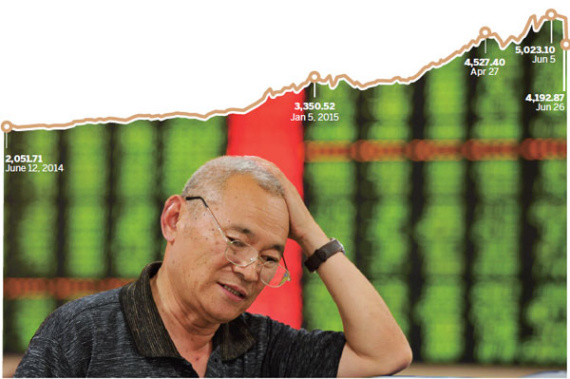Written by Yichao Wang, GEI Associate
The People’s Bank of China (PBOC) has taken a rare easing step, cutting the benchmark lending rate by 25 basis points to 4.85%, and lowering the reserve requirement ratio (RRR) for some lenders including city commercial and rural commercial banks by 50 basis points. The last time it did so was at the height of the global financial crisis, in October 2008.

According to PBOC, the policy easing this time is used in order to lower borrowing costs and boost economy. However, as the previous rate cut shows, the easing would have a limited impact on the overall economy. Due to the cooling inflation and banks’ reluctance to lend amid concerns over collateral and risk, the real cost of borrowing in China would still remain high.

Rather, as most analysts agree, the fact that the easing follows the biggest one-day decline in several years suggests that the action is taken to inject confidence in the stock market. On Friday, June 26, the Shanghai Composite Index fell 7.4% and was off 19% since hitting a 52-week high on June 12; Shenzhen’s benchmark index has also fallen more than 20% from a June 12 high, pushing it into bear-market territory. Recent warnings from regulators about borrowing too much money to buy shares, as well as the efforts to cut the level of margin lending in the system, are two key reasons for the pull back.

The market plunge threatens to undermine recent progress on restoring growth momentum. It could also undermine the credibility of previous official statements that the government should focus on structural reforms. In response, Beijing took the rate cut as a signal to avoid panic in the financial market and to boost confidence, which plays an important role in the Chinese economy.
Moreover, the growth of the stock market is also important to Beijing as a tool for financial reform. In the case of debt-burdened state-owned companies, higher stock prices can help them to repair their balance sheets by increasing the relative value of firms’ assets. Companies can subsequently selling stakes or issuing new shares, using the cash to pay down their substantial borrowings. Consequently, as these state-owned enterprises expand their capital, it becomes much easier to carry out mergers of them, making them more competitive.
On the other hand, the growth of the market can also reduce the economy’s reliance on bank lending, especially of the private entrepreneurs. The stock market can crate a financing channel for companies that are denied access to bank lending.
There are also other positive influences of stock market boom such as spurring demand and reducing capital outflows due to the sharp drop in property prices. Therefore, as Chinese stocks still plunge, Beijing is likely to use other measures to save the stock market.







